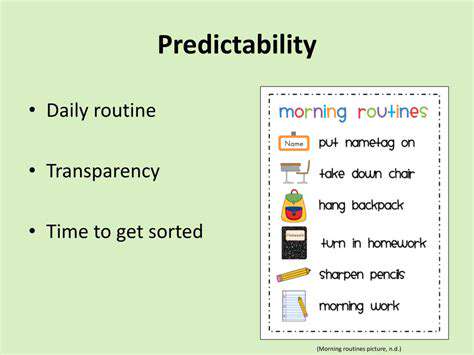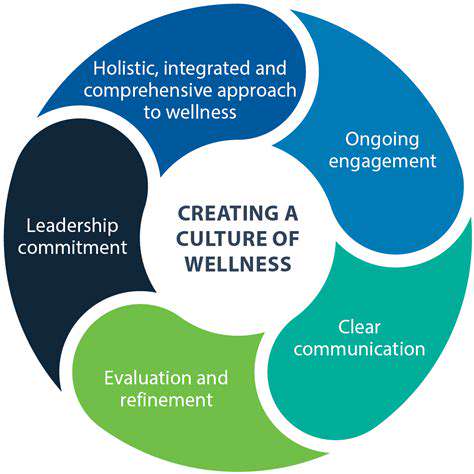How a Consistent Schedule Reduces Anxiety in Children
The Importance of Routine in Child Development
The Role of Predictability in Child’s Life
Children thrive in environments where they understand what to expect. A consistent schedule provides a level of predictability that can help them feel more secure. When children know what comes next in their day, it reduces the uncertainty that can lead to anxiety.
Predictability in daily activities, such as meal times, bedtimes, and homework hours, creates a sense of stability. This stability allows children to focus more on learning and socializing, rather than worrying about what might happen next.
Moreover, when children are familiar with their routines, they are more likely to engage in positive behaviors. Understanding the structure of their day encourages them to anticipate and look forward to enjoyable events, which further lessens feelings of anxiety.
Emotional Safety and Comfort
A consistent schedule fosters emotional safety and comfort for children. Knowing what to expect from their daily routines gives them a framework within which they feel secure. This sense of safety is crucial for their emotional well-being.
When children have set times for activities, they are less likely to feel overwhelmed by the unknown. Each part of the day becomes a familiar space where they can express themselves and develop their feelings without fear of sudden changes.
This emotional safety is particularly important during stressful life events, such as moving to a new home or the arrival of a sibling. Having a consistent routine can provide a calming anchor amidst chaos, helping children to navigate their emotions more effectively.
Building Independence and Confidence
Regular schedules help children learn to manage their time effectively. As they become accustomed to a routine, they start to take ownership of their tasks, which builds their independence. For instance, knowing when to do homework or getting ready for bed can empower them to manage these responsibilities without constant adult reminders.
With increased independence comes greater self-confidence. When children successfully follow their routines, they experience a sense of achievement. This success reinforces their ability to handle tasks on their own, fostering a positive self-image.
Additionally, encouraging independent behavior within a structured schedule gives children the skills they need to cope with responsibilities as they grow. This preparation is essential for their transition into adolescence, where more complex time management will be required.
Creating Opportunities for Positive Interactions
A consistent schedule not only helps children manage their individual tasks but also lays the groundwork for positive social interactions. Scheduled playdates, family dinners, and group activities encourage children to build relationships with peers and family members.
When children know when they will interact with others, they can better prepare themselves mentally and emotionally, reducing anxiety about social situations. These interactions can become highlights of their day, reinforcing the importance of social connections in alleviating stress.
Furthermore, parents can utilize structured time to engage in meaningful conversations with their children. During these shared moments, children learn to express themselves and navigate complex feelings, equipping them with social skills that are vital for their overall development.
Benefits of Predictability in Daily Activities

Enhancing Security Through Routine
A consistent schedule provides children with a sense of stability and security. When children know what to expect each day, they are less likely to feel anxious about the unknown. This predictable environment fosters confidence and helps children develop coping strategies for various situations.
Routines can also mitigate the anxiety that often comes with transitions, such as moving from one activity to another. By establishing clear sequences, children become familiar with what comes next, which can greatly reduce their stress levels.
Furthermore, the security that comes from having a structured routine can be particularly beneficial for children with anxiety disorders. These children often thrive in environments where they can predict their daily activities, which leads to more successful interactions and behaviors.
Improving Emotional Regulation
Consistent daily activities equip children with the skills needed to manage their emotions better. By knowing what activities follow one another, children can prepare mentally and emotionally, which helps them handle feelings of anxiety more effectively. This preparation can make transitions smoother and calmer.
As children engage in repeating activities, they are also able to practice and reinforce emotional responses. For example, if a child knows that storytime always follows lunch, they can look forward to it and enter a more relaxed state.
The predictability inherent in a consistent schedule also allows children to identify and verbalize their feelings. This can be an essential step in teaching emotional awareness and self-regulation skills.
Fostering Independence and Self-Confidence
A well-structured routine can encourage children to take ownership of their daily tasks. The more children engage with their schedule, the more independent they become, as they learn to anticipate and prepare for activities on their own. This growing independence directly contributes to increased self-confidence.
As they successfully navigate their routines, children gain a sense of accomplishment that further reduces anxiety. Regularly completing tasks within their routines helps reinforce their belief in their own abilities, allowing them to tackle new challenges with confidence.
Moreover, independence fosters decision-making skills. Children who are comfortable with routines can begin to make choices regarding their activities, which empowers them and reduces feelings of helplessness in unfamiliar situations.
Strategies for Implementing a Consistent Schedule
Establishing a Daily Routine
Creating a daily routine is essential for children as it provides them with a sense of security. When children know what to expect throughout the day, they feel more in control and less anxious. A structured schedule allows them to anticipate activities, reducing the likelihood of anxiety-induced surprises.
Parents can start by outlining key daily activities such as wake-up times, meal times, homework, playtime, and bedtime. Consistency in timing helps reinforce this routine. Utilizing visual aids, like charts or schedules, can make it easier for children to understand and follow their daily tasks.
In addition to traditional schedules, incorporating transitions between activities can also provide clarity. Simple transition signals, like a timer or a song, can prepare children for what comes next, easing the shift from one activity to another, which might otherwise induce stress.
Flexibility within the routine is just as important. Life can be unpredictable, and allowing for minor adjustments to the schedule can teach children resilience. When they understand that change is a possibility, they become better equipped to handle unexpected events without experiencing overwhelming anxiety.
Ultimately, a daily routine fosters independence in children. As they become accustomed to managing their time and responsibilities, they gain confidence in their ability to navigate their day, reducing feelings of helplessness and anxiety.
Incorporating Predictable Transitions
Transitions throughout the day can be significant stressors for children. By implementing predictable transitions, parents can provide smoother shifts between activities, which helps minimize anxiety. For instance, signaling the end of playtime with a five-minute warning can prepare a child mentally for the upcoming change.
Using consistent phrases or songs to indicate transitions can also reinforce predictability. Children often find comfort in repetition, and these cues can help them feel less startled when it's time to move on to a new task.
Moreover, offering choices during transitions can give children a sense of control. For example, allowing them to choose which book to read during storytime can make them more willing to engage in the activity rather than resisting the change.
Visual schedules can further enhance predictability. Children can mark off completed tasks or use icons that represent different activities. This not only gives them a clear visual of their day but also engages them in the process of following their schedule, making it more interactive.
By understanding their schedule and what to expect, children are more likely to transition smoothly. This reduces the chances of anxiety spiraling, allowing for a more relaxed atmosphere both at home and in other settings.
Engaging Children in the Scheduling Process
Involving children in the creation of their own schedules can be incredibly beneficial. When children contribute to planning their tasks and activities, they feel a sense of ownership, which can drastically reduce anxiety related to being told what to do. Providing them with options empowers them to make decisions.
Parents can hold discussions with their children about what activities they enjoy and want to include in their routine. This not only helps in building a schedule that reflects the child’s interests but also gives them the confidence to voice their preferences.
Incorporating play during the scheduling process can also enhance engagement. Activities like using colored markers to draw out the schedule or using stickers for positive reinforcement can make the experience enjoyable and less daunting for children.
Regularly reviewing and adjusting the schedule with the child promotes adaptability. As children grow and develop, their needs and interests change, and having open conversations about these changes ensures that the schedule remains relevant and effective.
Ultimately, when children feel involved and valued in their scheduling process, it can substantially decrease their anxiety levels. They will understand that they have a role in managing their time, which can instill greater self-confidence and lessen feelings of unease about their day.
The Long-Term Impact of a Structured Environment
The Benefits of Routine for Children
A consistent daily routine helps children develop a sense of security and predictability. When children know what to expect, they are less likely to feel anxious about the unknown. This familiarity allows them to focus on tasks at hand, whether it’s schoolwork, playtime, or homework, rather than worrying about what might happen next.
In addition to providing security, routines can also promote independence. Children can learn to manage their time better when they know the structure of their day. From getting ready for school in the morning to winding down before bedtime, a clear routine empowers children to take charge of their daily activities, fostering self-confidence and resilience.
How Routine Enhances Emotional Regulation
Children often experience a range of emotions, and a consistent schedule can play a crucial role in teaching them how to manage those feelings. When they know what to expect, children have the opportunity to practice emotional regulation strategies in a safe environment. For example, knowing that transition time to homework is coming up allows them to mentally prepare and shift focus accordingly.
Moreover, structured schedules can help in identifying patterns in emotional responses. If a child consistently feels anxious during unstructured playtime, parents and caregivers can step in to help create a solution, whether it involves guiding them through social interactions or introducing calming techniques. This awareness and understanding can significantly reduce anxiety in the long run.
The Role of Consistency in Building Trust
Consistent routines foster a sense of trust between children and their caregivers. When children see that their parents or guardians keep to a predictable schedule, they feel valued and understood. This trust allows children to express their emotions more freely and can lead to stronger family relationships.
Additionally, when caregivers are consistent in their responses to both routine activities and emotional challenges, children learn that they can rely on their adults for support. This attachment reduces anxiety and builds a foundation for healthier emotional development. As they grow, children who experience consistent care are better equipped to manage stress and anxiety on their own.




